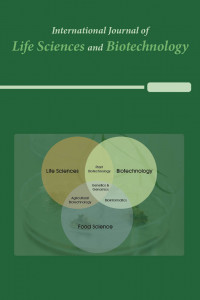Homology Modeling of L18F Mutation on SARS-CoV-2 Spike Protein Receptor-Binding-Domain
Abstract
Proteins have unique properties to participate in many structural and physiological processes. Knowledge of the three-dimensional structure of proteins is important to understand their roles in the physiological processes and the functions of these processes. Any structural defect in proteins due to mutations can cause diseases, treatment unresponsiveness, and drug resistance development. The recent emergence of the new SARS-CoV-2 variants containing mutations that accelerate the spread of the virus by affecting infectiousness has been of concern. In the study, visualization of the homology model and investigation of the chemical properties of L18F mutation responsible for the formation of mutant type SARS-CoV-2 spike protein via in silico approach was intended. In this study, amino acid number, molecular weight, theoretical pI value, the percentage composition of amino acids, total negatively charged residue number, total positively charged residue number, atomic composition, formula, total atomic number, molar extinction coefficient, aliphatic index, and the average hydropathy were calculated via ProtParam. The FASTA amino acid sequence was used for visualization of the homology models via UCSF Chimera in wild-type and mutant-type spike proteins. Basic chemical calculations also were displayed on BIOVIA Discovery Studio Visualizer. ΔΔG value and the changes in the stability in L18F mutation were predicted via I-Mutant Suite software. We detected that location of the mutant residue is near a highly conserved position and the L18F mutation may not cause the damage.
References
- 1. Lee, M. J., & Yaffe, M. B. Protein regulation in signal transduction. Cold Spring Harbor Perspectives in Biology, 2016. 8(6). https://doi.org/10.1101/cshperspect.a005918
- 2. Fuentes-Prior, P., & Salvesen, G. S.The protein structures that shape caspase activity, specificity, activation, and inhibition. Biochemical Journal, 2004. https://doi.org/10.1042/BJ20041142
- 3. Longley, D. B., & Johnston, P. G. Molecular mechanisms of drug resistance. Journal of Pathology, 2005. https://doi.org/10.1002/path.1706
- 4. Naveca, F., Nascimento, V., Souza, V., Corado, A., Nascimento, F., Silva, G., Gräf, T. Phylogenetic relationship of SARS-CoV-2 sequences from Amazonas with emerging Brazilian variants harboring mutations E484K and N501Y in the Spike protein. Virological.Org, 2021. 1–12.
- 5. https://www.ncbi.nlm.nih.gov/ Access date: 15.06.2022.
- 6. Waterhouse, A., Bertoni, M., Bienert, S., Studer, G., Tauriello, G., Gumienny, R., Heer, F.T., de Beer, T.A.P., Rempfer, C., Bordoli, L., Lepore, R., Schwede, T. SWISS-MODEL: homology modelling of protein structures and complexes. Nucleic Acids Res. 46, 2018. p.296-303.
- 7. Pettersen, EF, Goddard, TD, Huang, CC, Couch, GS, Greenblatt, DM, Meng, EC, Ferrin, TE. (2004). J Comput Chem,2004. 25(13): p.1605-12.
- 8. Gasteiger, E., Hoogland, C., Gattiker, A., Duvaud, S., Wilkins, M.R., Appel, R.D., Bairoch, A. Protein Identification and Analysis Tools on the ExPASy Server;(In) John M. Walker (ed): The Proteomics Protocols Handbook, Humana Press, 2005. pp. 571-607.
- 9. www.swissmodel.expasy.org. Access date: 15.06.2022
SARS-CoV-2 Spike Protein Reseptör Bağlanma Bölgesinde L18F Mutasyonunun Homoloji Modellemesi
Abstract
Proteinler, birçok yapısal ve fizyolojik sürece katılmak için benzersiz özelliklere sahiptir. Proteinlerin üç boyutlu yapısının bilinmesi, proteinlerin fizyolojik süreçlerdeki rollerini ve bu süreçlerin işlevlerini anlamak için önemlidir. Mutasyonlar nedeniyle proteinlerdeki herhangi bir yapısal bozukluk hastalıklara, tedaviye yanıtsızlığa ve ilaç direnci gelişimine neden olabilir. Son zamanlarda bulaşıcılığı etkileyerek virüsün yayılmasını hızlandıran mutasyonlar içeren yeni SARS-CoV-2 varyantlarının ortaya çıkması endişe kaynağı olmuştur. Çalışmada, mutant tip SARS-CoV-2 spike proteininin oluşumundan sorumlu olan L18F mutasyonunun homoloji modelinin görselleştirilmesi ve kimyasal özelliklerinin in silico yaklaşımla araştırılması amaçlanmıştır. Bu çalışmada amino asit sayısı, moleküler ağırlık, teorik pI değeri, amino asitlerin yüzde bileşimi, toplam negatif yüklü kalıntı sayısı, toplam pozitif yüklü kalıntı sayısı, atom bileşimi, formül, toplam atom numarası, molar yok olma katsayısı, alifatik indeks, ve ortalama hidropati ProtParam aracılığıyla hesaplandı. FASTA amino asit dizisi, vahşi tip ve mutant tip sivri proteinlerde UCSF Chimera aracılığıyla homoloji modellerinin görselleştirilmesi için kullanıldı. Temel kimyasal hesaplamalar da BIOVIA Discovery Studio Visualizer'da görüntülendi. ΔΔG değeri ve L18F mutasyonundaki stabilite değişiklikleri I-Mutant Suite yazılımı ile tahmin edildi. Mutant kalıntının konumunun yüksek oranda korunmuş bir konuma yakın olduğunu ve L18F mutasyonunun hasara neden olmayabileceğini tespit ettik.
References
- 1. Lee, M. J., & Yaffe, M. B. Protein regulation in signal transduction. Cold Spring Harbor Perspectives in Biology, 2016. 8(6). https://doi.org/10.1101/cshperspect.a005918
- 2. Fuentes-Prior, P., & Salvesen, G. S.The protein structures that shape caspase activity, specificity, activation, and inhibition. Biochemical Journal, 2004. https://doi.org/10.1042/BJ20041142
- 3. Longley, D. B., & Johnston, P. G. Molecular mechanisms of drug resistance. Journal of Pathology, 2005. https://doi.org/10.1002/path.1706
- 4. Naveca, F., Nascimento, V., Souza, V., Corado, A., Nascimento, F., Silva, G., Gräf, T. Phylogenetic relationship of SARS-CoV-2 sequences from Amazonas with emerging Brazilian variants harboring mutations E484K and N501Y in the Spike protein. Virological.Org, 2021. 1–12.
- 5. https://www.ncbi.nlm.nih.gov/ Access date: 15.06.2022.
- 6. Waterhouse, A., Bertoni, M., Bienert, S., Studer, G., Tauriello, G., Gumienny, R., Heer, F.T., de Beer, T.A.P., Rempfer, C., Bordoli, L., Lepore, R., Schwede, T. SWISS-MODEL: homology modelling of protein structures and complexes. Nucleic Acids Res. 46, 2018. p.296-303.
- 7. Pettersen, EF, Goddard, TD, Huang, CC, Couch, GS, Greenblatt, DM, Meng, EC, Ferrin, TE. (2004). J Comput Chem,2004. 25(13): p.1605-12.
- 8. Gasteiger, E., Hoogland, C., Gattiker, A., Duvaud, S., Wilkins, M.R., Appel, R.D., Bairoch, A. Protein Identification and Analysis Tools on the ExPASy Server;(In) John M. Walker (ed): The Proteomics Protocols Handbook, Humana Press, 2005. pp. 571-607.
- 9. www.swissmodel.expasy.org. Access date: 15.06.2022
Details
| Primary Language | English |
|---|---|
| Journal Section | Research Articles |
| Authors | |
| Early Pub Date | May 14, 2022 |
| Publication Date | December 15, 2022 |
| Published in Issue | Year 2022 Volume: 5 Issue: 3 |

